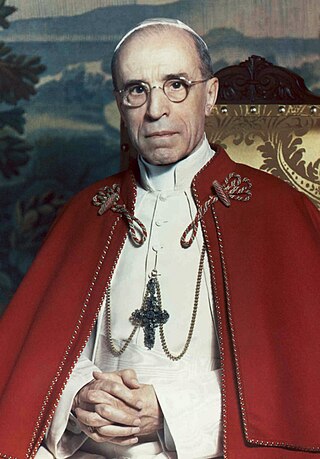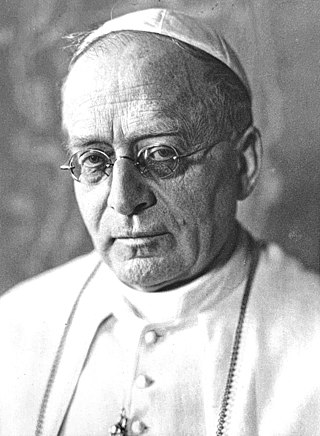
Pope Pius XII was head of the Catholic Church and sovereign of the Vatican City State from 2 March 1939 until his death in October 1958. Before his election to the papacy, he served as secretary of the Department of Extraordinary Ecclesiastical Affairs, papal nuncio to Germany, and Cardinal Secretary of State, in which capacity he worked to conclude treaties with various European and Latin American nations, including the Reichskonkordat treaty with the German Reich.

Pope Pius XI, born Ambrogio Damiano Achille Ratti, was the Bishop of Rome and head of the Catholic Church from 6 February 1922 to 10 February 1939. He also became the first sovereign of the Vatican City State upon its creation as an independent state on 11 February 1929. He remained pope until his death in February 1939.
Quadragesimo anno is an encyclical issued by Pope Pius XI on 15 May 1931, 40 years after Leo XIII's encyclical Rerum novarum, further developing Catholic social teaching. Unlike Leo XIII, who addressed the condition of workers, Pius XI discusses the ethical implications of the social and economic order. He describes the major dangers for human freedom and dignity arising from unrestrained capitalism, from socialism, and from communism as practised in Russia. He also calls for the reconstruction of the social order based on the principles of solidarity and subsidiarity.

Mit brennender Sorge is an encyclical of Pope Pius XI, issued during the Nazi era on 10 March 1937. Written in German, not the usual Latin, it was smuggled into Germany for fear of censorship and was read from the pulpits of all German Catholic churches on one of the Church's busiest Sundays, Palm Sunday.
Catholic social teaching (CST) is an area of Catholic doctrine which is concerned with human dignity and the common good in society. It addresses oppression, the role of the state, subsidiarity, social organization, social justice, and wealth distribution. CST's foundations are considered to have been laid by Pope Leo XIII's 1891 encyclical, Rerum novarum, which advocated distributism. Its roots can be traced to Catholic theologians such as Thomas Aquinas and Augustine of Hippo. CST is also derived from the Bible and cultures of the ancient Near East.
Humani generis unitas was a draft for an encyclical planned by Pope Pius XI before his death on February 10, 1939. The draft text condemned antisemitism, racism and the persecution of Jews. Because it was never issued, it is sometimes referred to as "The Hidden Encyclical" or "The Lost Encyclical". Humani generis unitas was written by three Jesuits under the leadership of John LaFarge. The draft text remained secret until published in 1995 in France and in 1997 in English as The Hidden Encyclical of Pius XI.
A conspiracy of silence, or culture of silence, describes the behavior of a group of people that by unspoken consensus does not mention, discuss, or acknowledge a given subject. The practice may be motivated by positive interest in group solidarity or by negative impulses such as fear of political repercussion or social ostracism. Unlike a taboo subject or the use of euphemisms, a conspiracy of silence is limited to specific social and political contexts rather than to an entire culture.
Pope Pius XII and Russia describes relations of the Vatican with the Soviet Union, Russia, the Eastern Orthodox Church, and the Eastern Catholic Churches resulting in the eradication of the Church in most parts of the Soviet Union during the Stalinist era. Most persecutions of the Church occurred during the pontificate of Pope Pius XII.

The Mariology of the popes is the theological study of the influence that the popes have had on the development, formulation and transformation of the Roman Catholic Church's doctrines and devotions relating to the Blessed Virgin Mary.
Social teachings of the papacy encompass papal views described in social encyclicals and other papal communications, beginning with Rerum novarum, Pope Leo XIII's encyclical of 1891.
Redemptoris may refer to :
The Decree Against Communism was a 1949 Catholic Church document issued by the Supreme Sacred Congregation of the Holy Office, and approved by Pope Pius XII, which declared Catholics who professed atheistic communist doctrine to be excommunicated as apostates from the Christian faith. It did not prohibit membership in communist parties per se, but applied to Catholic communists who 'abandoned their faith'. The decree was issued in response to pro-communist and state-sponsored Catholic associations being founded in the socialist Eastern Bloc, which prompted fears of schism. The Vatican stopped enforcing the decree after reaching compromises with the socialist states, starting with an agreement reached with the Polish People's Republic in 1950. The decree has since been abrogated, and is no longer valid.

Holy See–Soviet Union relations were marked by long-standing ideological disagreements between the Catholic Church and the Soviet Union. The Holy See attempted to enter in a pragmatic dialogue with Soviet leaders during the papacies of John XXIII and Paul VI. In the 1990s, Pope John Paul II's diplomatic policies were cited as one of the principal factors that led to the dissolution of the Soviet Union.

The papacy of Pius XII began on 2 March 1939 and continued to 9 October 1958, covering the period of the Second World War and the Holocaust, during which millions of Jews were murdered by Adolf Hitler's Germany. Before becoming pope, Cardinal Pacelli served as a Vatican diplomat in Germany and as Vatican Secretary of State under Pius XI. His role during the Nazi period has been closely scrutinised and criticised. His supporters argue that Pius employed diplomacy to aid the victims of the Nazis during the war and, through directing his Church to provide discreet aid to Jews and others, saved hundreds of thousands of lives. Pius maintained links to the German Resistance, and shared intelligence with the Allies, but at the same time he developed alliances with Nazi Germany and Fascist Italy and even arranged secret negotiations with Hitler's envoys. His strongest public condemnation of genocide was, however, considered inadequate by the Allied Powers, while the Nazis viewed him as an Allied sympathizer who had dishonoured his policy of Vatican neutrality.
Pope Pius XII's 1942 Christmas address was a speech delivered by Pope Pius XII over Vatican Radio on Christmas 1942. It is notable for its denunciation of the extermination of people on the basis of race, and followed the commencement of the Nazi Final Solution program to exterminate the Jews of Europe. The significance of the denunciation is a matter of scholarly debate.

During the pontificate of Pope Pius XI (1922–1939), the Weimar Republic transitioned into Nazi Germany. In 1933, the ailing President von Hindenburg appointed Adolf Hitler as Chancellor of Germany in a Coalition Cabinet, and the Holy See concluded the Reich concordat treaty with the still nominally functioning Weimar state later that year. Hoping to secure the rights of the Church in Germany, the Church agreed to a requirement that clergy cease to participate in politics. The Hitler regime routinely violated the treaty, and launched a persecution of the Catholic Church in Germany.
The Roman Catholic Church in the 20th century entered into a period of renewal, responding to the challenge of increasing secularization of Western society and persecution resulting from great social unrest and revolutions in several countries. A major event in the period was the Second Vatican Council, which took place between 1962 and 1965. The church instituted reforms, especially in the 1970s after the conclusion of the Council, to modernize practices and positions. On taking office part way through the Council, Pope Paul VI referred to "an impatient struggle for renewal".
The public statements of Pope Pius XII on the Holocaust, or lack thereof, are one of the most controversial elements of the historical debate about Pope Pius XII and the Holocaust. Pius XII's statements have been scrutinized as much, if not more, than his actions during the same period. Pius XII's statements, both public and private, are quite well documented in the Vatican Secret Archives; eleven volumes of documents from his papacy were published between 1965 and 1981 in Actes et documents du Saint Siège relatifs à la Seconde Guerre Mondiale.
Foreign relations between Pope Pius XI and Spain were very tense, especially because they occurred within the context of the Spanish Civil War and the period of troubles preceding it.
The Association of Catholic Trade Unionists (ACTU) was a labor organization associated with Catholic Worker newspaper.







